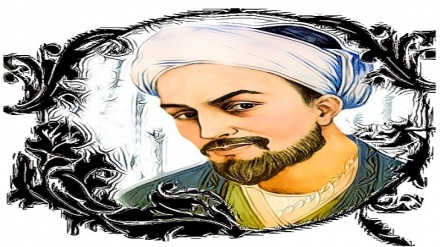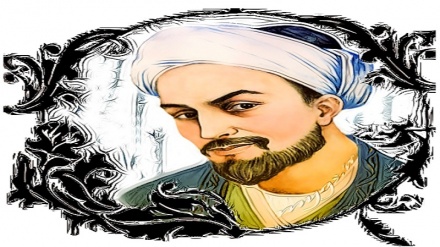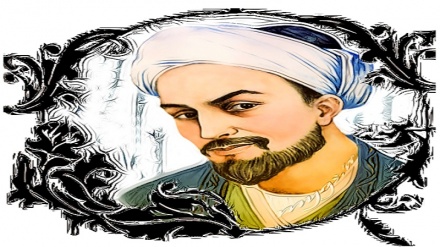Iranian notables, sources of global honor (200)
If you remember, it was said that Fakhruddin Eraqi was a prominent Muslim mystic and poet of Farsi language in the 7th century AH (13th century AD) who was born in Komjan village of Hamedan province.
It was also said that he learnt the Qur’an by heart in 9 months at the age of 5. At the age of 17, Eraqi was a master of all sciences of the day and started teaching in the city of Hamedan. Very soon he left Hamedan for Multan in the Subcontinent to join the pupils of the renowned mystic of the time, Sheikh Baha’uddin Zakaria. Then, he reached a degree in mysticism that Sheikh Zakaria gave his own cloak to Eraqi and he became one of the prominent students of the Sheikh. Later on, he traveled to Mecca, and left there for Konia in today’s Turkey to attend the class of Sheikh Sadruddin Qunavi. Thus, he stayed in Konia till 675 AH when he went to Egypt and then Syria to stay in Damascus till the end of his life. It is said that Eraqi succumbed to a painful and fatal disease when he was 78 or 82 years old. He was buried at Jabal al-Salihiya behind the tomb of Muhyiddin ibn Arabi. Fakhruddin Eraqi has authored several books. This time we are going to dwell upon the features of Fakhruddin Eraqi’s poetry. Stay tuned.
A brief glance at the lyrics of Fakhruddin Eraqi reveals his mentality and ideology. He is categorized among those mystics who are called Malāmatiyun; that is, those mystics who would behave in a way to be considered as heedless of worships and obligations so that they are rebuked by most people. In their opinion, they would be able to escape reputation and fame and could move in the way of truth more easily. In other words, the Malāmatiyun preferred to be knows as bad people rather than righteous ones. They thought that reputation is a big hurdle on the way of perfection and reaching the Beloved.
Another theme of Eraqi’s school is the contrast between the intellect and love. Love is one of the concepts that have been dealt with broadly in the mystic and lyric literature. The most important difference of mystic love with the physical love is that the mystic love stems from cognizance and affection; thus it is infinite. Eraqi describes the heart that is devoid of love as the abode of demon. The first point that he touches upon in this field is that love has existed from the very beginning when there was no beginning.
عشق شوری در نهاد ما نهاد جان ما در بوتة سودا نهاد
Love made us zealous inwardly
And put our soul in melancholy
گفتگویی در زبان ما فکند جستجویی در درون ما نهاد
On our tongue, a discourse it put,
A quest in us it caused cordially.
داستان دلبران آغاز کرد آرزویی در دل شیدا نهاد
The story of darlings it began,
Aspiring the lover inwardly
دم بدم در هر لباسی رخ نمود لحظه لحظه جای دیگر پا نهاد
Changing its colour every moment,
Traveling inwardly and outwardly.
Eraqi maintains that goodness and beauty need a place and chance to be manifested. He believes that if there is no lover, to whom will the beloved mince? Ahmad Ghazali, too, believes that the beloved needs the lover. Eraqi maintains that the lover should sacrifice his life for the mincing of the beloved.
با عشق تو ناز در نگنجد جز درد و نیاز در نگنجد
No room for mincing with your love,
Nothing but pain and need of love.
چه ناز کنی عراقی جان باز که ناز در نگنجد
No use to mince, o you Eraqi!
Sacrifice life, no room for mincing with love.
Ghazali, too, says that in the field of love, the whole dignity and grandeur belongs to the beloved and every weakness, meanness and misery belongs to the lover.
Dear listeners, as it was said before, the real beloved is God and not the worldly beloved as most of the Westerners describe the word. In the view of Eraqi, love is the sole ruler and there is no room for the intellect. Such mystics believe that the intellect cannot reach the truth unless it becomes prefect.
Eraqi deals with the pain of love very much in his lyrics. This is what the mystic and the traveler of the way of God are in quest of. In their view, pain causes the hidden jewel to emerge. Mystics consider a very little pain superior to both worlds. Eraqi says,
درمان اگر نداری، باری به درد یادآر کز دوست هرچه آید آن یادگار باشد
If you have no access to remedy, stick to pain,
With pain you can live, if there is a true friend
This very belief has caused pain and grief to enter mysticism. Professor Saeed Hamidian maintains that happy grief among mystics means that lofty grief is intermingled with happiness and there is no genuine happiness unless with a mixture of grief and vice versa. Eraqi says,
مرا گرچه ز غم جان می برآید غم عشقت زجانم خوشتر آید
Although grief puts an end to my life
Your love’s grief is far better than life
درین تیمار گر یک دم غم تو بپرسد حال من جانم برآید
So, once your grief asks me of my state,
I will sacrifice the very moment my life
RM/ME


